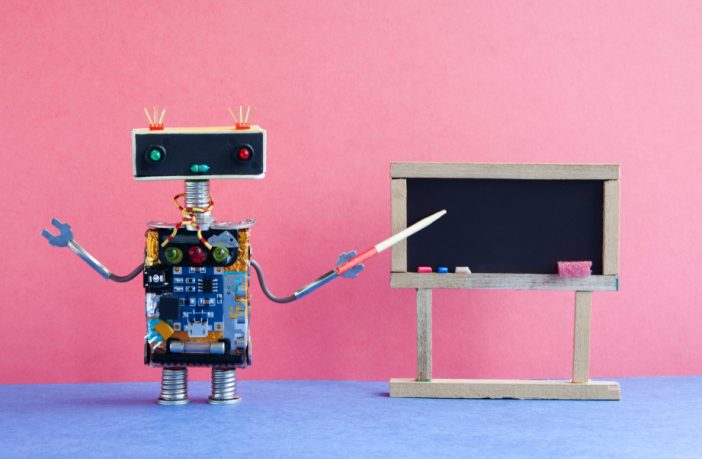The world seems to be at your fingertips every second of the day. If you want to know something then you just look it up on the internet. We can find out facts about anything and everything instantly. So why do we still need teachers? We put the question to some of the team behind the new Educating the Next Generation module – Dr Alison Fox, Dr Clare Lee, Kris Stutchbury, Clare Woodward and Dr Jane Cullen:
1. They develop thinking skills

Teachers are preparing children for the challenges ahead
Thinking is becoming more and more important.
As more tedious, mundane tasks are taken over by robots so the requirements for people who can problem solve, are flexible, are empathetic, can work collaboratively, be reflective and think creatively increases. Teachers in the future will develop these thinking skills safely and in a supportive environment, and will offer feedback that guides the students’ next steps.
It’s likely that our future citizens will have more leisure time, and that divisions between work and leisure will blur. As more manual and administrative roles are taken up by robots, people will be able to take up more creative and enjoyable working lives.
Young people must be prepared to thrive in a world that is unimaginable now. Teachers can help prepare them to take on those challenges.
2. They understand the growing brain
Teachers understand what it means to develop thinking skills, what progress looks like and where and how to intervene when things go awry. They have the experience and understanding to support and challenge students as they grow through childhood into young adulthood.
Teachers understand how to develop sociability and empathy in young children as well as helping them learn to read and develop number sense. Their experience allows them to comprehend what parents might consider the mysterious workings of the teenage brain, the emotional roller-coaster that teenagers ride, and the risks they need to take if they are to move into adulthood.
Teachers provide the emotional support and boundaries that will help children becoming flourishing adults in a future world, something that robots could not be programmed to do.
3. They breed curiosity
How can you know what you don’t know? Ask a teacher.
 It is a teacher’s job to widen horizons and to show young people what may be possible. They offer ideas from many different disciplines so that students begin to understand what is known and knowable in the world.
It is a teacher’s job to widen horizons and to show young people what may be possible. They offer ideas from many different disciplines so that students begin to understand what is known and knowable in the world.
Effective teachers breed curiosity about what might be possible, they show that learning need have no limits. They open up the world, looking globally for inspiration and opportunities.
Teachers allow students to take ownership and follow their own interests, whilst ensuring that other ideas and paths are not closed down too soon. Whereas robotic guidance would be limited, teachers allow students to dream and then encourage them to follow that dream.
4. They help navigate fake news
It is easy to find information on the internet or ‘Ask Alexa’ but, is that information reliable? Is it the most accurate information that can be found? Is it worthwhile information?
Teachers for the future must enable all young people to think critically. The information available is now so vast but is it too variable to be worth paying attention to? What will be the effect on local communities of making certain choices? Will there be global repercussions?
Young people must critically evaluate the information they act on as well as the actions they take in order to live happily and sustainably on the earth.
5. They help children thrive in an uncertain future
No-one knows what the world will be like in twenty years but those starting school this year will need to take their place in that world. The world is getting more connected and seems smaller. Global issues cannot be ignored. No-one would argue, certainly not teachers, that we all want young people to thrive and flourish in this unknown world and work to allow the earth to thrive as well.
Find out more:
Learn about educating the next generation with our latest module EE830, which forms part of our Masters in Education.
Take part in the Badged Open Course on OpenLearn – Looking Globally: The Future of Education (the badge from this can be used towards the first assessment in the module EE830).
Explore all of our #TomorrowsEd articles, videos and resources



